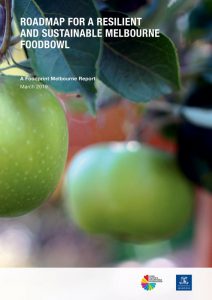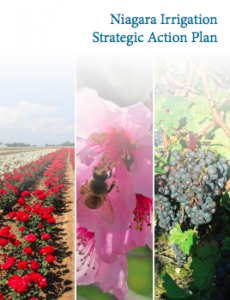 The University of Melbourne has recently published a report, Roadmap for a Resilient and Sustainable Melbourne Foodbowl, which thoroughly outlines a vision for preserving and strengthening Melbourne’s foodbowl.
The University of Melbourne has recently published a report, Roadmap for a Resilient and Sustainable Melbourne Foodbowl, which thoroughly outlines a vision for preserving and strengthening Melbourne’s foodbowl.
Though centred around Melbourne, the report shares pertinent insight for agricultural areas in Canada and elsewhere, as it addresses challenges that will translate to many growing regions today, including the Golden Horseshoe – e.g. urban sprawl and rapid population growth.
In fact, the Golden Horseshoe Food and Farming Alliance was pleased to be among those interviewed for the report.
The report was developed through a collaborative process, drawing on research from policy reviews, interviews and workshops with various stakeholders, and case studies of international best practice – focusing on Toronto ON, Vancouver BC, and Portland, Oregon.
“The international case studies conducted for this project emphasise the importance of implementing policy to actively promote the viability of farming in peri-urban regions,” page 36 of the report shares.
Toronto, Vancouver and Portland were chosen because each are recognized as international leaders in protecting regions of food production on their borders, and they all face similar challenges to Melbourne.
For instance, page 30 explains: “Melbourne’s foodbowl is still an important source of fresh food. In 2015, it had the capacity to meet around 41% of Greater Melbourne’s food needs and over 80% of its fresh vegetable needs. However, while the city’s demand for food is increasing due to rapid population growth, the capacity of Melbourne’s foodbowl to meet this demand is falling, as farmland is displaced for new housing.”
 Water management is another area that will become increasingly important with a warming climate and growing population. Water scarcity has affected food production in Melbourne’s food bowl, and the report notes the significance of addressing this challenge with solutions like reusing urban wastewater. In the future, the Golden Horseshoe may face similar water issues. Niagara Region has developed a Niagara Irrigation Strategic Action Plan that addresses a need for a coordinated irrigation system using Great Lakes water.
Water management is another area that will become increasingly important with a warming climate and growing population. Water scarcity has affected food production in Melbourne’s food bowl, and the report notes the significance of addressing this challenge with solutions like reusing urban wastewater. In the future, the Golden Horseshoe may face similar water issues. Niagara Region has developed a Niagara Irrigation Strategic Action Plan that addresses a need for a coordinated irrigation system using Great Lakes water.
“The agricultural sector in the Niagara Region has a critical need for a strategic plan for irrigation,” page 6 of the action plan shares. “The plan will determine a strategy that enables the abundant resources from the Great Lakes and Region’s river and canal systems to be effectively and efficiently used by farmers.”
The Niagara action plan notes in its introduction that the unusually dry conditions in 2016 underscored the urgency to better address water security needs of growers in Niagara for irrigation purposes.
Overall, amidst the wealth of information and ideas shared, the Melbourne report presents recommendations in five key areas:
- Farmland Protection
- Farm Viability
- Water Access
- Nutrient Recycling
- Sustainable Farming
Key elements from the report are summarized on this page here, many of which correspond with the GHFFA action plan, such as:
- an integrated policy approach
- key pillars of policy action
- farmland protection
- promoting the viability of farming
- investing in infrastructure
- integrated water management approach
- returning valuable nutrients from city organic waste back to the soil
- nutrient recycling, and more
You’ll also see in the report that Metro Vancouver has adopted a Regional Food System Strategy and created a Metro Vancouver Regional Food System Action Plan. The Oregon Department of Agriculture has mapped and assessed agricultural lands in the Portland metropolitan region at the request of the Metro government farmland protection.
View the full report here: https://research.unimelb.edu.au/foodprint-melbourne/publications/roadmap-for-a-resilient-city-foodbowl
The Foodprint Melbourne project is led by an inter-faculty team at the University of Melbourne, with team members based in the Faculty of Veterinary and Agricultural Sciences and the Melbourne Sustainable Society Institute. The project is funded by the Lord Mayor’s Charitable Foundation and involves local governments as key partners.
